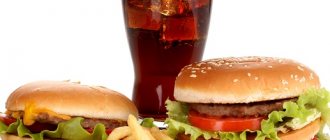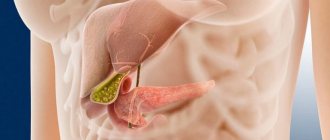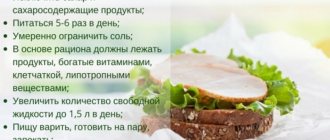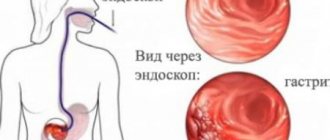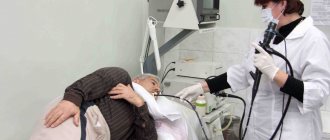An upset stomach is often associated with a symptom such as diarrhea. However, this condition is more characterized by a dyspeptic phenomenon associated with improper digestion of food. An upset stomach is an unpleasant pathology that can lead to dangerous consequences. It occurs as a result of an unbalanced diet, consumption of low-quality products, poisoning, damage to the mucous membrane or other provoking factors.
This disease manifests itself as follows: pain in the abdomen, bloating, increased gas formation, diarrhea, nausea and vomiting. The advanced stage of the disorder leads to dehydration and other complications. By starting treatment in a timely manner, you can quickly relieve symptoms.
Causes of indigestion
If we consider the causes of indigestion, we need to highlight the following:
- functional dyspepsia;
- acute or chronic gastritis;
- gastroesophageal disease;
- esophagitis;
- Crohn's disease;
- chronic pancreatitis with reduced exocrine function;
- oncological diseases;
- peptic ulcer;
- food poisoning;
- functional biliary disorders;
- congenital anomalies of the development of the stomach in childhood;
- keel of the diaphragm.
Symptoms of indigestion
The feeling of indigestion is a subjective feeling of dysfunction of the digestive system. Usually it is described by patients in slightly different ways, so you should always clarify what exactly worries them the most.
Typically, if you have an upset stomach, you can identify the following signs of indigestion:
- a feeling of heaviness in the upper abdomen, which intensifies after eating or breaking a diet;
- periodic aching pain, which can intensify with physical activity;
- belching (sometimes with an unpleasant odor);
- feeling of nausea after a hearty meal, single vomiting;
- loss of appetite, weight loss
- burning sensation in the chest, heartburn after eating fatty or spicy foods;
- tendency to constipation or diarrhea;
- the presence of a white coating on the tongue;
- severe bloating, frequent flatulence;
- increase in body temperature to low-grade levels;
- general weakness and intoxication.
Surgical operations
Surgery is not used to treat indigestion per se. Intervention is carried out if negative symptoms are caused by serious diseases. For example, malignant tumors.
To prevent indigestion, it is important to eat properly, chew food thoroughly, and avoid eating unwashed vegetables and fruits. It is necessary to avoid stress and give the body rest. Physical activity should be moderate. Any disease must be treated on time. If stomach upset lasts for a long time, it is important to consult a doctor immediately. Only he can choose the correct treatment plan.
General dietary guidelines for indigestion
Nutrition for upset stomach and intestines should help restore their normal functioning. Therefore, it is compiled based on the following principles:
- Reducing the load on the mucous membrane. You need to exclude from your diet all dishes and foods that can irritate the stomach wall.
- No stimulation of acidity. Diet products should not contribute to the production of hydrochloric acid by the parietal cells of the stomach.
- Thermal protection of the mucous membrane. All foods and dishes that a person eats should not be too hot or cold. Their temperature should be 30-50°C.
- Regularity and adequacy of nutrition. You need to train yourself to eat regularly at the same intervals every day. At the same time, you need to avoid fast foods and give preference to homemade food. The diet must include a sufficient amount of fiber, vegetables, and fruits.
- Taking into account age and physical activity. The amount of food consumed by a professional athlete and an office worker should be different. It is necessary to calculate the required amount of energy and nutrients for a particular person.
- Focus on the patient's tastes. When creating a diet, you should always take into account the interests of the person to whom it is assigned. Otherwise he will not comply with it.
What are the benefits of cottage cheese for diarrhea and diarrhea?
For diarrhea, gastroenterologists and nutritionists advise including foods in the menu that do not irritate the digestive tract. You should eat dishes that are warm, soft in consistency, and have a slight fixing effect. The benefit of cottage cheese lies in its unique composition.
He contains:
- easily digestible fats and proteins;
- microelements;
- minerals;
- calcium;
- phosphorus;
- choline (a substance with a vitaminizing effect, increases the body's defenses).
For diarrhea and diarrhea, the benefit of cottage cheese lies in the content of a large number of fermented milk bacteria, which are necessary for the intestines to function normally. When the body is dehydrated, a large loss of calcium occurs. Cottage cheese will help replenish the balance of substances in the body.
Freshly prepared fermented milk product prevents the proliferation of viruses and pathogenic microorganisms, stops the inflammatory process in the intestines, and normalizes its microflora.
Prohibited Products
What can't you eat if you have an upset stomach? Carbonated drinks (including alcoholic drinks, kvass, lemonade and mineral water) are completely excluded from the diet. It is also prohibited to drink strong tea or coffee as drinks, as they can stimulate the production of hydrochloric acid by the gastric mucosa.
Also, meat (smoking) broths can increase acidity, so they are also not included in the diet in the presence of hypersecretory conditions. Fatty meats (pork, duck, goose) have a similar effect. The diet also does not include soups with a large amount of spices, red borscht and okroshka.
Fresh baked goods negatively affect the digestive processes, as do pastry products. If a patient buys pies, then you need to pay attention to the nature of the filling.
With high acidity, fermented milk products (kefir, fermented baked milk) are strictly prohibited. Some types of hard cheese contain a large amount of spices and therefore should not be eaten.
If you look at vegetables, onions, radishes, rutabaga, cucumbers, spinach, and white cabbage are not included in the diet. You should avoid eating peanuts, legumes, and nuts. All sour berries (blueberries, strawberries, lingonberries, gooseberries, currants) and citrus fruits are also undesirable.
Canned and pickled foods, most spices, mustard, tomato paste, horseradish, ketchup, and sauces are completely removed from the diet.
Additionally, it is advisable to avoid the following products:
- persimmons;
- grapes;
- fatty types of fish fillets;
- corn, pearl barley or barley;
- fried eggs;
- dried fruits;
- sweet products containing chocolate.
Is it possible to use cottage cheese for diarrhea in a child?
Cottage cheese for diarrhea has a strengthening property; it can be given to children, following the recommendations of doctors and nutritionists. The product is a healthy treat and is included in the baby’s menu from 8 months of age. Up to 3 years of age, pediatricians advise giving homemade or store-bought cottage cheese, intended specifically for baby feeding.
When making homemade cottage cheese, use low-fat milk as a base. Fatty cottage cheese will worsen the child’s condition with diarrhea and intensify its course. Store-bought cottage cheese should contain no more than 2.5% fat content.
It is necessary to give a dish to a child during diarrhea, focusing on the baby’s age and reaction to the fermented milk product. If any form is not suitable for the baby, it is better to replace it with low-fat kefir or homemade yogurt. You can give cottage cheese to children in the following forms.
Children under one year old
Up to a year only in the form of store-bought low-fat cottage cheese. For diarrhea, give no more than 1-3 teaspoons. Monitor your child's well-being. If the first portion of the product does not negatively affect the condition, you can offer the baby more cottage cheese a few hours later.
Note! Children under one year old with diarrhea should not be given cottage cheese or other foods as complementary foods. This can cause a severe allergic reaction and intestinal dysbiosis.
Baby under 3 years old
For a child under 3 years old, offer a homemade fermented milk product; you can add dried fruits and bananas to it. The serving per day should not exceed 100 grams.
For older children
Older children and preschoolers can be given cottage cheese with low-fat yogurt. It is better if both products are homemade. Portion - no more than 200 grams.
Giving cottage cheese to a child with diarrhea is necessary when the acute phase of the disease has passed and there is no dehydration. It is useful to include the product in the menu when diarrhea goes away. It will help quickly restore the intestinal microflora and improve the functioning of the gastrointestinal tract.
Authorized Products
What to eat for an upset stomach? Preference should be given to lean meats (for example, beef, turkey, horse meat, or rabbit meat). The most optimal preparation option is boiled (you can make zrazy, steamed cutlets, meatballs or soufflé). In this case, you need to ensure that all solid particles (bones, cartilage) are removed. If the dish is prepared for older people, you can chop it more thoroughly to avoid possible digestive difficulties.
Do the same with fish. They also offer low-fat varieties here. You can cook pike perch, pollock, pike, flounder, carp, hake, cod, mullet. When cleaning fish, you should try to remove all bones and scales.
Bakery products included in the diet include day-old white bread or buns without sour filling. It is also recommended to give preference to dry, unpalatable cookies, cheesecakes or biscuits without chocolate. If necessary, they can be dried a little at home.
Cereals are almost always found in the diet for stomach disorders. Many of them contain large amounts of mucus, which can cover the gastric mucosa and protect against various aggressive factors. They give preference to buckwheat, rice, semolina and oatmeal. Rice water can be given as a separate drink. Pasta (provided it is thoroughly cooked) and mashed potatoes (without adding oil) are also left without restrictions.
If you look at drinks, it is recommended to drink still table water, sweet juices, weak tea (both traditional and from chamomile, St. John's wort or calendula), rose hip decoction.
Foods for an upset stomach include dairy products - especially low-fat yoghurt, milk or sour cream. You can also eat cottage cheese and dishes made from it.
Other products that are recommended are:
- hard cheese (mild);
- honey;
- baked fruits;
- soups with milk;
- soft-boiled eggs (smoked or quail).
Treatment
Dyspepsia can have several causes, so comprehensive treatment for indigestion is prescribed.
At the same time, specialists strive to eliminate the symptoms of the disease and generally improve the health of the gastrointestinal tract. Depending on the specific features of dyspepsia, doctors determine how to treat the patient.
Firstly, a strictly selected diet is used. It is developed by nutritionists, taking into account the individual characteristics of the patient, the causes of the disorder and the type of disease. If fermentative dyspeptic disorder is observed, then you need to consume more foods rich in protein (fish, meat, cottage cheese), while easily digestible carbohydrates should be excluded from the diet.
Secondly, drug treatment is used. The decision on how to treat the disease is made by a specialist after a thorough examination of the patient. You cannot prescribe treatment for yourself; this often leads to disastrous consequences. The right treatment can help relieve symptoms. You need to take antacids and antisecretory drugs, agents with an enveloping effect, prokinetics, antibacterial and painkillers. In some cases, depending on the cause of the dyspeptic disorder, antidepressants may be prescribed.
In case of illness, a strictly selected diet is used.
What to do if you have an intestinal disorder must be decided on a case-by-case basis, depending on the cause of the disease. The main methods of therapy are:
- changing the diet, giving up bad habits - the patient is recommended to eat in small frequent portions, give up fried, spicy, foods that cause increased gas formation;
- taking medications for the unpleasant symptoms of the disorder - these will be antacids, alginates, suspensions;
- restoration of regular intestinal microflora with medications.
The doctor decides what to take for intestinal upset. The following categories of medicines are distinguished:
- For first aid - activated carbon, Smecta and enterosorbents. They absorb toxins that enter the intestines and eliminate the problem.
- Loperamide is an emergency medicine that can be used without diagnosing the cause of the disease. The drug acts quickly, but is not suitable for children under three years of age.
- Antidiarrheals – Imodium, Cerucal.
- To restore microflora - Bactisubtil, Linex, Hilak Forte, Probifor, Bifistim. The products contain a suspension of bacteria beneficial to the intestines, which in the process of action kill pathogenic microorganisms of the rectum, produce vitamins and restore normal intestinal microflora.
- Antiviral drugs - Arbidol-Lance, Kipferon suppositories.
- Preventing dehydration - Regidron, Trihydron, Gidrovit. They restore the loss of vital substances and normalize the acid-base balance.
Treatment for indigestion involves taking medications with a specific category of effects. The main medications to eliminate unpleasant symptoms are enterosorbents.
Below is a list of the most effective medications that can be taken for severe stomach upset.
- Smecta. Natural enterosorbent containing aluminum-magnesium silicate. The medicine has pronounced absorbing properties, which promotes the rapid removal of toxins from the body. A single dosage is 1 sachet every 4 hours.
- Activated carbon has enterosorbing, antidiarrheal and detoxification properties. The drug is often used for indigestion in a dosage of 1 tablet per 10 kg of weight.
- Enterosgel. An adsorbent detoxification drug that promotes the rapid removal of various wastes, toxins, bacteria and allergens from the body.
- Kaopectate is a preparation containing a purified mixture of aluminum hydrates and magnesium silicate. The medicine is presented in the form of a solution and tablets. The daily dosage should not exceed 12 tablets.
- Polysorb. A preparation containing colloidal silicon dioxide, which has good binding properties and promotes the rapid removal of pathogenic microorganisms and toxins. The medicine is prescribed to infants.
- Polyphenal. An adsorbent drug containing hydrolytic lignin that effectively affects toxins in the body in case of indigestion. The medicine has a low pricing policy.
Eliminating negative symptoms of indigestion involves taking medications to normalize intestinal microflora.
- Lactobacterin. A preparation for restoring microflora containing live bacteria. Effective for indigestion due to the development of diseases of the digestive system and other disorders in the body.
- Acipol. A preparation containing kefir protein polysaccharide and acidophilus bacteria. Tablets are prescribed for dysbiosis, persistent disorder, chronic colitis, after long-term use of antibiotics.
- Linux. A popular remedy for restoring microflora in tablet form. The drug is presented in tablet form and is often prescribed as an adjuvant in the treatment of various infectious diseases with antibiotics.
- Bifidumbacterin. A drug of probiotic origin in the form of tablets and powder, which is prescribed to restore normal intestinal function. The medicine contains live bifidobacteria, which have a beneficial effect on the intestinal microflora.
When making a diagnosis, it is important not to confuse the concepts of functional dyspepsia and ordinary indigestion, since the first disease is a type of chronic gastritis and requires the appointment of an appropriate treatment regimen.
To eliminate unpleasant symptoms, drugs such as Almagel, Maalox, Lansoprazole, Rabeprazole are used. Medicines in this category help prevent the presence of constant belching and heartburn that occurs before or after eating food.
Of course, home remedies can quickly stop the problem, both in adults and children - such treatment should be started if you are sure of a slight malaise. If diarrhea is accompanied by fever, vomiting, and dehydration, there is only one way - see a doctor!
There are a lot of reasons for the disease, we won’t describe them (here everyone must analyze the situation themselves, why the trouble happened). The symptoms, I think, are also clear to everyone. We would like to immediately draw your attention to folk methods that help get rid of diarrhea.
During an acute condition, along with medications, a special diet is the first thing that must be followed. You should drink A LOT!!! water, eating any food in the first hours is not recommended. Do not eat anything heavy, spicy, no fresh fruits and vegetables, or alcohol. Dried bread, cereals, baked apples, lean boiled meat and jelly should be included in the diet.
| Products not recommended for consumption | Products recommended for consumption |
| Fatty, fried, smoked, baked goods, fruits, vegetables. | Porridge: rice, buckwheat, oatmeal. Baked apples, dried fruit compote, crackers (not sweet), biscuits, chicken, rabbit, turkey (boiled), potatoes. |
If diarrhea begins in children, then a gentle diet and plenty of fluids are the first aid. The solution to this problem will be rice water (cook 2 tablespoons of rice in 0.5 liters of water over low heat and let it brew for 20 minutes), give 50 g 4 times a day. Dried pear compote and dried blueberries.
If the diarrhea is like water, then you need to restore the water-salt balance with the help of the drug "Regidron". Dissolve 1 sachet in chilled boiled water and take 50–100 ml every 3–5 minutes.
Traditional medicine is quite strong in this matter and has effective recipes for normalizing intestinal function during diarrhea. Let's present the most effective ones.
Sample menu
The daily treatment menu for the disorder looks something like this:
- First breakfast (8-9 am) - includes oatmeal cooked in water, two soft-boiled eggs and a glass of still table mineral water.
- Second breakfast (11 o'clock in the afternoon) - consists of slightly warmed cottage cheese with sugar (but without butter) and tea with milk.
- Lunch (2 p.m.) – served rice vegetable soup (can be served with boiled lean meat), mashed potatoes, a steamed cutlet, several baked fruits (apples, pears) and weak tea.
- Afternoon snack (5 p.m.) – enough dry biscuits (bagels) and a glass of non-sour yogurt.
- Dinner (20 pm) - the patient eats buckwheat porridge (without oil), boiled fillet of a lean fish, a glass of sweet juice.
- Before bed (22 hours) – baked apple with weak tea.
Who should not eat cottage cheese for diarrhea and diarrhea?
Despite the fact that the dish is beneficial for the body, not everyone can consume it during periods of stool upset. Cottage cheese is contraindicated for the following people.
- With individual intolerance to fermented milk products. Eating such a dish during diarrhea will cause a strong reaction, including Quincke's edema.
- You should not eat cottage cheese if you have cholelithiasis (cholelithiasis) or pancreatitis. In this case, the dish can be included in the menu after diarrhea has passed for recovery. You should eat a low-fat product in small portions.
- If you have kidney problems. Stool disorder dehydrates the body, which affects the condition of the organ. Cottage cheese is rich in protein, which will be too much for the kidneys.
- You should not eat food with sugar if you have diabetes.
- If you are lactose intolerant, it is better to include the product in your diet during the recovery period.
Doctor's advice
Below are the main recommendations of a gastroenterologist regarding the treatment of dyspepsia:
- If the patient is worried about stomach upset, then the diet must first be adjusted.
- It is advisable to completely refrain from smoking and drinking alcoholic beverages.
- In addition, you need to avoid emotional overload and stress.
- If symptoms do not go away within a few days, but only intensify, be sure to seek qualified medical help. Then a full examination is carried out and the cause of dyspeptic symptoms is determined.
